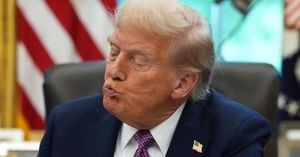Donald Trump’s unexpected win in the recent presidential election has sent waves across the financial markets, resulting in dramatic shifts, particularly within the investment circles. Analysts and investors alike have been eagerly tracking the market's responses, with many pointing to notable sectors experiencing significant rebounds. One of the most conspicuous beneficiaries of this change has been Geo Group, Inc. (NYSE: GEO), known for its operations within private prison management.
The company's stock was previously on shaky ground, dipping considerably from over $12 to around $7 leading up to Q1 2023. This is when famed investor Michael Burry, who gained prominence for his bet against the housing market during the 2008 financial crisis (immortalized in the film The Big Short), made his entry. Burry, through his Scion Asset Management, initially invested around $5 million back then. By the end of Q3, his stake had grown to approximately 600,000 shares valued at nearly $4.8 million.
Fast forward to November 5, the day of the election, and the stock price of Geo Group surged to $15.13. Following Trump's victory, shares skyrocketed by close to 92.5%, now trading at around $29.13. To put it bluntly, if Burry had held onto his original position, the value of his investment could have ballooned to approximately $17.48 million, translating to missed profits of around $12.68 million.
This sharp rise has been attributed largely to expectations surrounding Trump’s presidency. Investors are anticipating the reinstatement of policies aimed at bolstering the private prison industry—policies which had faced continued opposition under the previous administration. Trump's track record of favoring stricter immigration policies and other law enforcement measures is reigniting investor confidence, pushing the stocks of private prison operators like Geo Group to new heights.
While the immediate picture looks promising for many investors, forecasters are cautioning against over-optimism. Historical trends suggest stocks may not maintain their momentum indefinitely.
Keith Speights, writing for The Motley Fool, also touches upon the broader impact of Trump’s electoral success on the stock market. He predicts some immediate gains across stocks, particularly within the energy sector, where companies like Chevron and ExxonMobil could see upward movement due to Trump’s pro-fossil fuel stance. His repetitive call for “drill, baby, drill” indicates potential good fortunes for oil stocks should he take office again.
The article also suggests the S&P 500 could enjoy what’s termed as a relief rally following the elections. Investors may react positively, leading to modest gains as uncertainty about the presidential race fades. Interestingly, it’s worth noting Trump's first term as president saw the S&P 500 rally by approximately 70%, leading some investors to draw parallels to the current situation.
Conversely, there are concerns about long-term economic ramifications should Trump move to implement his proposed tariffs. With speeches promising steep tariffs on various goods, including imports from China and vehicles built in Mexico, the investment community is watching closely. UBS has projected such tariffs could trigger around a 10% drop within the U.S. stock market, particularly affecting industries like retail and automotive.
Markus Schneider from UBS noted the repercussions of these tariff plans could contribute to inflationary pressures which would, in turn, lead to potential interest rate hikes from the Federal Reserve. This creates concerns for many investors, particularly those wary of the historical heavy toll drawn from previous economic policies influenced by tariffs.
Xi Zhang, another investment analyst, strongly advises investors to remain cautious. Despite flashy returns recorded immediately after the election, he cautions against greed. Burry’s example serves as both validation of possible profits and cautionary warning about prematurely exiting lucrative investments.
Investors may explore options to safeguard their portfolios against potential downturns. Following Warren Buffett’s demonstrated strategies could be prudent. By maintaining liquid assets for deployment during market downturns and avoiding knee-jerk reactions, investors can position themselves favorably, irrespective of the political climate.
Interestingly, Speights also suggests taking note of potential undervalued stocks. With constant fluctuations and opportunities for buying at discounts, being selective is more important than ever. Notably, whether one agrees with or supports the policies propagated by Trump, the resulting market movements offer valuable insights for tactical investment adjustments.
While political seasons come and go, the underlying economics and market behaviors often reflect patterns observable across time. Investors are reminded to focus on these patterns rather than short-term market noise to secure successful investment endeavors.
Whether from short-term rallies or the looming effects of governmental policies, the financial world continues to adapt and change with each election. The only certainty remains the necessity for investors to remain informed, adaptive, and strategic, ensuring they make calculated decisions reflective of both political and economic vistas.
To summarize, as the smoke begins to clear from the recent elections, the investment market stands poised for movement, particularly within certain sectors influenced by Donald Trump’s policies. Although immediate gains are enticing, maintaining vigilance concerning potential longer-term ramifications becomes increasingly necessary. Investors may find themselves needing to balance excitement for growth with cautious planning against possible market corrections seeded within the upcoming political agenda.



